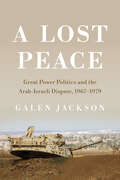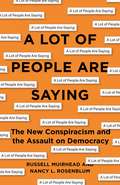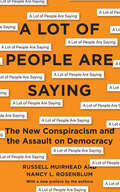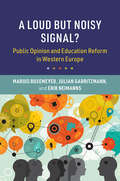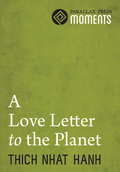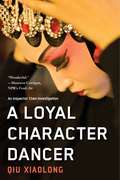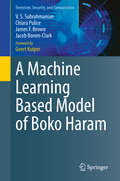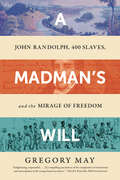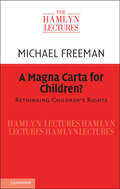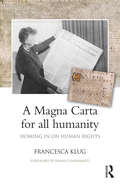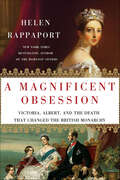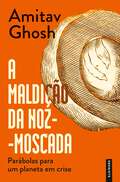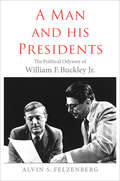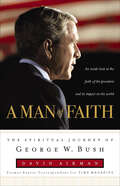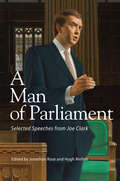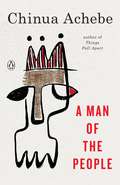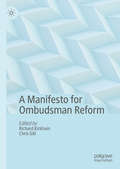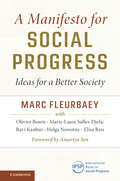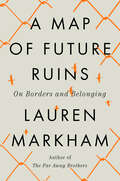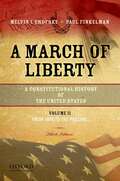- Table View
- List View
A Lost Peace: Great Power Politics and the Arab-Israeli Dispute, 1967–1979 (Cornell Studies in Security Affairs)
by Galen JacksonIn A Lost Peace, Galen Jackson rewrites an important chapter in the history of the middle period of the Cold War, changing how we think about the Arab-Israeli conflict.During the June 1967 Middle East war, Israeli forces seized the Sinai Peninsula and the Gaza Strip from Egypt, the Golan Heights from Syria, and the West Bank and East Jerusalem from Jordan. This conflict was followed, in October 1973, by a joint Egyptian-Syrian attack on Israel, which threatened to drag the United States and the Soviet Union into a confrontation even though the superpowers had seemingly embraced the idea of détente. This conflict contributed significantly to the ensuing deterioration of US-Soviet relations.The standard explanation for why détente failed is that the Soviet Union, driven mainly by its Communist ideology, pursued a highly aggressive foreign policy during the 1970s. In the Middle East specifically, the conventional wisdom is that the Soviets played a destabilizing role by encouraging the Arabs in their conflict with Israel in an effort to undermine the US position in the region for Cold War gain.Jackson challenges standard accounts of this period, demonstrating that the United States sought to exploit the Soviet Union in the Middle East, despite repeated entreaties from USSR leaders that the superpowers cooperate to reach a comprehensive Arab-Israeli settlement. By leveraging the remarkable evidence now available to scholars, Jackson reveals that the United States and the Soviet Union may have missed an opportunity for Middle East peace during the 1970s.
A Lot of People Are Saying: The New Conspiracism and the Assault on Democracy
by Nancy L. Rosenblum Russell MuirheadHow the new conspiracists are undermining democracy—and what can be done about itConspiracy theories are as old as politics. But conspiracists today have introduced something new—conspiracy without theory. And the new conspiracism has moved from the fringes to the heart of government with the election of Donald Trump. In A Lot of People Are Saying, Russell Muirhead and Nancy Rosenblum show how the new conspiracism differs from classic conspiracy theory, why so few officials speak truth to conspiracy, and what needs to be done to resist it.Classic conspiracy theory insists that things are not what they seem and gathers evidence—especially facts ominously withheld by official sources—to tease out secret machinations. The new conspiracism is different. There is no demand for evidence, no dots revealed to form a pattern, no close examination of shadowy plotters. Dispensing with the burden of explanation, the new conspiracism imposes its own reality through repetition (exemplified by the Trump catchphrase “a lot of people are saying”) and bare assertion (“rigged!”).The new conspiracism targets democratic foundations—political parties and knowledge-producing institutions. It makes it more difficult to argue, persuade, negotiate, compromise, and even to disagree. Ultimately, it delegitimates democracy.Filled with vivid examples, A Lot of People Are Saying diagnoses a defining and disorienting feature of today’s politics and offers a guide to responding to the threat.
A Lot of People Are Saying: The New Conspiracism and the Assault on Democracy
by Nancy L. Rosenblum Russell MuirheadHow the new conspiracists are undermining democracy—and what can be done about itConspiracy theories are as old as politics. But conspiracists today have introduced something new—conspiracy without theory. And the new conspiracism has moved from the fringes to the heart of government with the election of Donald Trump. In A Lot of People Are Saying, Russell Muirhead and Nancy Rosenblum show how the new conspiracism differs from classic conspiracy theory, how it undermines democracy, and what needs to be done to resist it.
A Loud but Noisy Signal?: Public Opinion and Education Reform in Western Europe (Cambridge Studies in the Comparative Politics of Education)
by Marius R. Busemeyer Julian L. Garritzmann Erik NeimannsThis path-breaking addition to the Comparative Politics of Education series studies the influence of public opinion on the contemporary politics of education reform in Western Europe. The authors analyze new data from a survey of public opinion on education policy across eight countries, and they also provide detailed case studies of reform processes based on interviews with policy-makers and stakeholders. The book's core finding is that public opinion has the greatest influence in a world of 'loud' politics, when salience is high and attitudes are coherent. In contrast, when issues are salient but attitudes are conflicting, the signal of public opinion turns 'loud, but noisy' and party politics have a stronger influence on policy-making. In the case of 'quiet' politics, when issue salience is low, interest groups are dominant. This book is required reading for anyone seeking to make sense of policy-makers' selective responsiveness to public demands and concerns.
A Love Letter To The Planet
by Thich Nhat HanhA passionate appeal for ecological mindfulness and strengthening our relationship to the Earth. Based on the best selling The World We Have.
A Love Letter to Europe: An outpouring of sadness and hope – Mary Beard, Shami Chakrabati, Sebastian Faulks, Neil Gaiman, Ruth Jones, J.K. Rowling, Sandi Toksvig and others
by Various Melvyn Bragg Lindsey Davis Pete Townshend Chris Cleave Chris Riddell Margaret Drabble Philip Ardagh Mary Beard William Dalrymple Will Hutton Holly Johnson Simon Callow Prue Leith Brian Catling Tony Robinson Tracey Emin Shami Chakrabarti Jonathan Meades Frank Cottrell Boyce J.K. Rowling Jeffrey Boakye Onjali Rauf Peter J ConradiHow are great turning points in history experienced by individuals?As Britain pulls away from Europe great British writers come together to give voice to their innermost feelings. These writers include novelists, writers of books for children, of comic books, humourists, historians, biographers, nature writers, film writers, travel writers, writers young and old and from an extraordinary range of backgrounds. Most are famous perhaps because they have won the Booker or other literary prizes, written bestsellers, changed the face of popular culture or sold millions of records. Others are not yet household names but write with depth of insight and feeling.There is some extraordinary writing in this book. Some of these pieces are expressions of love of particular places in Europe. Some are true stories, some nostalgic, some hopeful. Some are cries of pain. There are hilarious pieces. There are cries of pain and regret. Some pieces are quietly devastating. All are passionate.Conceived as a love letter to Europe, this book may also help reawaken love for Britain. It shows the unique richness and diversity of British cultures, a multitude of voices in harmony.Contributors include:Hugh Aldersey-Williams, Philip Ardagh, Jake Arnott, Patricia Atkinson, Paul Atterbury, Richard Beard, Mary Beard, Don Boyd, Melvyn Bragg, Gyles Brandreth, Kathleen Burke, James Buxton, Philip Carr, Brian Catling, Shami Chakrabarti, Chris Cleave, Mark Cocker, Peter Conradi , Heather Cooper, Frank Cottrell-Boyce, Roger Crowley, David Crystal, William Dalrymple, Lindsey Davies, Margaret Drabble, Mark Ellen, Richard Evans, Michel Faber, Sebastian Faulks, Ranulph Fiennes, Robert Fox, James Fox, Neil Gaiman, Evelyn Glennie, James Hanning, Nick Hayes, Alan Hollinghurst, Gabby Hutchinson-Crouch, Will Hutton, Robert Irwin, Holly Johnson , Liane Jones, Ruth Jones, Sam Jordison, Kapka Kassabova, AL Kennedy, Hermione Lee, Prue Leith, Patrick Lenox, Roger Lewis, David Lindo, Penelope Lively, Beth Lync, Richard Mabey, Sue MacGregor, Ian Martin, Frank McDonough, Jonathan Meades, Andrew Miller, Deborah Moggach, Ben Moor, Alan Moore, Paul Morley, Jackie Morris, Charles Nicholl, Richard Overy, Chris Riddell, Adam Roberts, Tony Robinson, Lee Rourke, Sophie Sabbage, Marcus Sedgwick, Richard Shirreff, Paul Stanford, Isy Suttie, Sandi Toksvig, Colin Tudge, Ed Vulliamy, Anna Whitelock, Kate Williams, Michael Wood, Louisa Young
A Loyal Character Dancer
by Qiu XiaolongThe second book in the Inspector Chen investigationsInspector Chen’s mentor in the Shanghai Police Bureau has assigned him to escort US Marshal Catherine Rohn. Her mission is to bring Wen, the wife of a witness in an important criminal trial, to the United States. Inspector Rohn is already en route when Chen learns that Wen has unaccountably vanished from her village in Fujian. Or is this just what he is supposed to believe? Chen resents his role; he would rather investigate the triad killing in Shanghai’s beautiful Bund Park. Li insists that saving face with Inspector Rohn takes priority. So Chen Cao, the ambitious son of a father who imbued him with Confucian precepts, must tread warily as he tries once again to be a good cop, a good man and also a loyal Party member.
A Loyal Spy: A Thriller
by Simon ConwayWinner of the Ian Fleming Steel Dagger Award, a Contemporary Spy Thriller for Fans of Brad Thor and John Le Carré. The last time Jonah saw Nor ed-Din, he was lying face-down in a pool of icy water in the Khyber Pass. He thought he had killed him, but now the trail of betrayal has come full circle. Friends since childhood, Jonah and Nor ed-Din had been groomed for the intelligence service, with Jonah as handler for Nor's penetration of ISI. But when Nor is cut loose after the Soviets are forced to withdraw from Afghanistan, the pattern of engagement and abandonment begins. Years later, when contact with Nor is revived to stage an off-the-books, multi-agency assassination attempt on Bin Laden that goes badly wrong, Jonah no longer knows who Nor is really working for-and whether he has simply taken revenge on his former countrymen in a private act of jihad. In the aftermath of 9/11, the failed operation comes back to haunt its survivors, sowing mistrust when they most need CIA support. For, gradually, the outlines of a plot begin to emerge that takes Nor from the diamond fields of Africa to the mountains of Afghanistan and to the beating heart of London, where millions of lives are at stake.
A Machine Learning Based Model of Boko Haram (Terrorism, Security, and Computation)
by V. S. Subrahmanian Chiara Pulice James F. Brown Jacob Bonen-ClarkThis is the first study of Boko Haram that brings advanced data-driven, machine learning models to both learn models capable of predicting a wide range of attacks carried out by Boko Haram, as well as develop data-driven policies to shape Boko Haram’s behavior and reduce attacks by them. This book also identifies conditions that predict sexual violence, suicide bombings and attempted bombings, abduction, arson, looting, and targeting of government officials and security installations. After reducing Boko Haram’s history to a spreadsheet containing monthly information about different types of attacks and different circumstances prevailing over a 9 year period, this book introduces Temporal Probabilistic (TP) rules that can be automatically learned from data and are easy to explain to policy makers and security experts. This book additionally reports on over 1 year of forecasts made using the model in order to validate predictive accuracy. It also introduces a policy computation method to rein in Boko Haram’s attacks.Applied machine learning researchers, machine learning experts and predictive modeling experts agree that this book is a valuable learning asset. Counter-terrorism experts, national and international security experts, public policy experts and Africa experts will also agree this book is a valuable learning tool.
A Madman's Will: John Randolph, Four Hundred Slaves, and the Mirage of Freedom
by Gregory MayThe untold saga of John Randolph’s 383 slaves, freed in his much-contested will of 1821, finally comes to light. Few legal cases in American history are as riveting as the controversy surrounding the will of Virginia Senator John Randolph (1773–1833), which—almost inexplicably—freed all 383 of his slaves in one of the largest and most publicized manumissions in American history. So famous is the case that Ta-Nehisi Coates has used it to condemn Randolph’s cousin, Thomas Jefferson, for failing to free his own slaves. With this groundbreaking investigation, historian Gregory May now reveals a more surprising story, showing how madness and scandal shaped John Randolph’s wildly shifting attitudes toward his slaves—and how endemic prejudice in the North ultimately deprived the freedmen of the land Randolph had promised them. Sweeping from the legal spectacle of the contested will through the freedmen’s dramatic flight and horrific reception in Ohio, A Madman’s Will is an extraordinary saga about the alluring promise of freedom and its tragic limitations.
A Magna Carta for Children?: Rethinking Children's Rights (The Hamlyn Lectures)
by Michael FreemanThe UN Convention on the Rights of the Child is the most widely ratified human rights treaty in the world, yet everyday children still face poverty, violence, war, disease and disaster. Are the rights we currently afford to children enough? Combining historical analysis with international human rights law, Michael Freeman considers early legal and philosophical theories on children's rights before exploring the impact and limitations of the Convention itself. He also suggests ways that we may rethink children's rights in the future as well as identifying key areas for reform. This book will appeal to an interdisciplinary audience who are interested in children's rights, children's studies, the history of childhood, international human rights, and comparative family law. It is a crucial restatement of the importance of law, policy and rights in improving children's lives.
A Magna Carta for all Humanity: Homing in on Human Rights
by Francesca KlugThe Magna Carta, sealed in 1215, has come to stand for the rule of law, curbs on executive power and the freedom to enjoy basic liberties. When the Universal Declaration of Human Rights was adopted by the United Nations in 1948, it was heralded as 'a Magna Carta for all human kind'. Yet in the year in which this medieval Charter’s 800th anniversary is widely celebrated, the future of the UK’s commitment to international human rights standards is in doubt. Are ‘universal values’ commendable as a benchmark by which to judge the rest of the world, but unacceptable when applied ‘at home’? Francesca Klug takes us on a journey through time, exploring such topics as ‘British values,’ ‘natural rights,’ ‘enlightenment values’ and ‘legal rights,’ to convey what is both distinctive and challenging about the ethic and practice of universal human rights. It is only through this prism, she argues, that the current debate on human rights protection in the UK can be understood. This book will be of interest to students of British Politics, Law, Human Rights and International Relations.
A Magnificent Obsession: Victoria, Albert, and the Death That Changed the British Monarchy
by Helen RappaportAs she did in her critically acclaimed The Last Days of the Romanovs, Helen Rappaport brings a compelling documentary feel to the story of this royal marriage and of the queen's obsessive love for her husband – a story that began as fairy tale and ended in tragedy.After the untimely death of Prince Albert, the queen and her nation were plunged into a state of grief so profound that this one event would dramatically alter the shape of the British monarchy. For Britain had not just lost a prince: during his twenty year marriage to Queen Victoria, Prince Albert had increasingly performed the function of King in all but name. The outpouring of grief after Albert's death was so extreme, that its like would not be seen again until the death of Princess Diana 136 years later. Drawing on many letters, diaries and memoirs from the Royal Archives and other neglected sources, as well as the newspapers of the day, Rappaport offers a new perspective on this compelling historical psychodrama--the crucial final months of the prince's life and the first long, dark ten years of the Queen's retreat from public view. She draws a portrait of a queen obsessed with her living husband and – after his death – with his enduring place in history. Magnificent Obsession will also throw new light on the true nature of the prince's chronic physical condition, overturning for good the 150-year old myth that he died of typhoid fever.
A Maldição da Noz-Moscada: Parábolas para um Planeta em Crise
by AMITAV GHOSHUm livro polémico, uma crítica à cosmovisão do Ocidente por um dos mais conceituados romancistas da atualidade. Decorria o ano de 1621. A simples queda de um objeto, uma candeia, é o pretexto para o comandante das tropas holandesas aquarteladas numa das ilhas Banda, no território das Molucas, dar início ao massacre de toda a população local. Poucos habitantes sobreviveriam, e a sua língua e cultura perder-se-iam para sempre. A eliminação do povo Banda é um dos grandes genocídios esquecidos pela História. O motivo: o controlo por parte da Venerável Companhia das Índias Orientais do rentável comércio milenar da noz-moscada, uma especiaria muito apreciada na Europa pelos seus usos culinários e medicinais, de preço exorbitante, e cuja inteira produção mundial estava circunscrita até então a esse pequeno arquipélago do Índico. Em pleno século XXI, Amitav Ghosh, com mão de romancista, traz à luz este episódio negro, que serve de ponto de partida para relacionar o passado com o presente, o colonialismo com a atual crise climática, e explicar o mundo em que vivemos: da crise dos refugiados ao movimento Black Lives Matter, às cidades modernas ou mesmo às naturezas-mortas do período áureo da pintura holandesa. «Não deixem de ler este livro.» Naomi Klein «Urgente, maravilhoso e ambicioso… um livro de leitura obrigatória.» Times Literary Supplement «Ghosh recorre à literatura de viagens, à narrativa pessoal, à análise histórica e àsíntese de um vasto conhecimento académico para contar a história do nosso império ocidental e do extermínio do nosso mundo.» Los Angeles Review of Books «A Maldição da Noz-Moscada é, ao mesmo tempo, uma biografia não autorizada desta especiaria e um apelo a novas políticas que respeitem a ação ou “vitalidade” dos seres não humanos que nos rodeiam.»The White Review «Esclarecedor... Ghosh faz-nos pensar nas estruturas globais de poder que envolvem a subjugação física de povos e de territórios e, sobretudo, na ideia de conquista como um processo de extração.» The New Yorker«Um feito notável e um título atual, A Maldição da Noz-Moscada recorda-nos a razão pela qual a terra está a chorar.» Booklist «Ghosh escreveu uma obra que atinge o nosso cérebro e o nosso coração com uma clareza moral e analítica inesquecível.» Bloomberg
A Man and His Presidents: The Political Odyssey of William F. Buckley Jr.
by Alvin FelzenbergA new understanding of the man who changed the face of American politics William F. Buckley Jr. is widely regarded as the most influential American conservative writer, activist, and organizer in the postwar era. In this nuanced biography, Alvin Felzenberg sheds light on little-known aspects of Buckley’s career, including his role as back-channel adviser to policy makers, his intimate friendship with both Ronald and Nancy Reagan, his changing views on civil rights, and his break with George W. Bush over the Iraq War. Felzenberg demonstrates how Buckley conveyed his message across multiple platforms and drew upon his vast network of contacts, his personal charm, his extraordinary wit, and his celebrity status to move the center of political gravity in the United States closer to his point of view. Including many rarely seen photographs, this account of one of the most compelling personalities of American politics will appeal to conservatives, liberals, and even the apolitical.
A Man of Faith: The Spiritual Journey of George W. Bush
by David Aikman“Offers some Bush family history, examines his wayward years and details Bush’s transformation from churchgoer to a Christian who internalized his faith.” —Publishers WeeklyMore than any other world leader in recent times, George W. Bush is a man of faith . . . a conservative Christian who has brought the power of prayer and the search for God’s will into the Oval Office. His faith has proven to be a bedrock of strength and resolve during two of the most tumultuous years in our nation’s history. According to Newsweek magazine, “This presidency is the most resolutely faith based in modern times. An enterprise founded, supported and guided by trust in the temporal and spiritual power of God.” David Aikman, skilled journalist and former senior correspondent for TIME magazine, pens this dramatic and gripping account of Bush’s journey to faith. Based on interviews and behind-the-scenes stories, you’ll learn how . . . His life changed after a conversation with Billy Graham on the beach at KennebunkportHe walked away from alcoholism toward a new destinyThe events following 9/11 caused many to view him as God’s chosen man for this critical time in historyHis decision to go to war with Iraq became the ultimate test of his faithA Man of Faith . . . an intimate look at how Bush’s spiritual life has impacted his presidency, the nation, and the world.
A Man of Iron: The Turbulent Life and Improbable Presidency of Grover Cleveland
by Troy SenikA long-overdue biography of Grover Cleveland—the honest, principled, and plain-spoken president whose country has largely overlooked him.Featuring a wealth of in-depth research and newly uncovered details, A Man of Iron explores the remarkable life and extraordinary career of Grover Cleveland—one of America&’s most unusual presidents and the only one to serve two non-consecutive terms. Grover Cleveland&’s political career—a dizzying journey that saw him rise from obscure lawyer to president of the United States in just three years—was marked by contradictions. A politician of uncharacteristic honesty and principle, he was nevertheless dogged by secrets from his personal life. A believer in limited government, he pushed presidential power to its limits to combat a crippling depression, suppress labor unrest, and resist the forces of American imperialism. A headstrong executive who alienated Congress, political bosses, and even his own party, his stubbornness nevertheless became the key to his political appeal. The most successful Democratic politician of his era, he came to be remembered most fondly by Republicans. A fascinating look at a unique man presiding over a transformational era, A Man of Iron is a compelling and vivid biography joining the ranks of presidential classics such as David McCullough&’s John Adams, Ron Chernow&’s Grant, and Amity Shlaes&’s Coolidge.
A Man of Parliament: Selected Speeches from Joe Clark (Queen's Policy Studies Series #191)
by Jonathan Rose Hugh MellonJoe Clark - statesman, businessman, writer, and politician - served as the sixteenth prime minister of Canada from 4 June 1979 to 3 March 1980. Despite his relative inexperience, Clark rose quickly in federal politics, gaining a seat in the House of Commons in the 1972 election and winning the leadership of the Progressive Conservative Party only four years later. This volume collects a number of significant speeches from Joe Clark’s illustrious career in Parliament. It captures over forty years of his public service from when he was a rookie member of Parliament, to his time as the prime minister, a cabinet minister, and the senior statesman of the House of Commons. His speeches are arranged in thematic areas such as parliamentary accountability, foreign affairs, constitutional debates, and the economy. Insightful and wide-ranging, A Man of Parliament demonstrates that Joe Clark’s influence on Parliament continues to shape contemporary policy debates.
A Man of Parliament: Selected Speeches from Joe Clark (Queen's Policy Studies Series #191)
by Jonathan Rose and Hugh MellonJoe Clark - statesman, businessman, writer, and politician - served as the sixteenth prime minister of Canada from 4 June 1979 to 3 March 1980. Despite his relative inexperience, Clark rose quickly in federal politics, gaining a seat in the House of Commons in the 1972 election and winning the leadership of the Progressive Conservative Party only four years later. This volume collects a number of significant speeches from Joe Clark's illustrious career in Parliament. It captures over forty years of his public service from when he was a rookie member of Parliament, to his time as the prime minister, a cabinet minister, and the senior statesman of the House of Commons. His speeches are arranged in thematic areas such as parliamentary accountability, foreign affairs, constitutional debates, and the economy. Insightful and wide-ranging, A Man of Parliament demonstrates that Joe Clark's influence on Parliament continues to shape contemporary policy debates.
A Man of the People
by Chinua AchebeFrom the renowned author of The African Trilogy, a political satire about an unnamed African country navigating a path between violence and corruption As Minister for Culture, former school teacher M. A. Nanga is a man of the people, as cynical as he is charming, and a roguish opportunist. When Odili, an idealistic young teacher, visits his former instructor at the ministry, the division between them is vast. But in the eat-and-let-eat atmosphere, Odili's idealism soon collides with his lusts--and the two men's personal and political tauntings threaten to send their country into chaos. When Odili launches a vicious campaign against his former mentor for the same seat in an election, their mutual animosity drives the country to revolution. Published, prophetically, just days before Nigeria's first attempted coup in 1966, A Man of the People is an essential part of Achebe's body of work dealing with modern African history.
A Man's Reach
by Elmer L. Andersen Lori SturdevantAutobiography of the popular Minnesota Governor in the 1950's.
A Manifesto for Ombudsman Reform
by Richard Kirkham Chris GillThis book seeks to persuade policy-makers and legislators of the need for legislative reform of the ombudsman sector, and to evidence the ways in which such reformative legislation can be designed. In pursuing this goal, this edited collection represents an academic response to a challenge laid down by the current Parliamentary Ombudsman in February 2018, at a JUSTICE event. It draws on the original research of the authors and bases its proposals for reform on a fundamental re-assessment of the focus and purpose of ombudsman systems. A Manifesto for Ombudsman Reform deals with key, recurring controversies in ombudsman scholarship, including the role that the ombudsman should be fulfilling, the procedures it should employ, the powers that are necessary for effectiveness, and the means of ensuring both freedom of operation and accountability. It will inform academic and policy debates about the future of the ombudsman institution in the UK and its analysis should be of interest to academics and policy-makers in other jurisdictions.
A Manifesto for Social Progress: Ideas For A Better Society
by Helga Nowotny Ravi Kanbur Marc Fleurbaey Elisa Reis Olivier Bouin Salles-Djelic Marie-LaureAt this time when many have lost hope amidst conflicts, terrorism, environmental destruction, economic inequality and the breakdown of democracy, this beautifully written book outlines how to rethink and reform our key institutions - markets, corporations, welfare policies, democratic processes and transnational governance - to create better societies based on core principles of human dignity, sustainability, and justice. This new vision is based on the findings of over 300 social scientists involved in the collaborative, interdisciplinary International Panel on Social Progress. Relying on state-of-the-art scholarship, these social scientists reviewed the desirability and possibility of all relevant forms of long-term social change, explored current challenges, and synthesized their knowledge on the principles, possibilities, and methods for improving the main institutions of modern societies. Their common finding is that a better society is indeed possible, its contours can be broadly described, and all we need is to gather forces toward realizing this vision.
A Map of Future Ruins: On Borders and Belonging
by Lauren Markham&“This stunning meditation on nostalgia, heritage, and compassion asks us to dismantle the stories we&’ve been told—and told ourselves—in order to naturalize the forms of injustice we&’ve come to understand as order.&” —Leslie Jamison, author of The Empathy Exams When and how did migration become a crime? Why does ancient Greece remain so important to the West&’s idea of itself? How does nostalgia fuel the exclusion and demonization of migrants today? In 2021, Lauren Markham went to Greece, in search of her own Greek heritage and to cover the aftermath of a fire that burned down the largest refugee camp in Europe. Almost no one had wanted the camp—not activists, not the country&’s growing neo-fascist movement, not even the government. But almost immediately, on scant evidence, six young Afghan refugees were arrested for the crime. Markham soon saw that she was tracing a broader narrative, rooted not only in centuries of global history but also in myth. A mesmerizing, trailblazing synthesis of reporting, history, memoir, and essay, A Map of Future Ruins helps us see that the stories we tell about migration don&’t just explain what happened. They are oracles: they predict the future.
A March of Liberty: A Constitutional History of the United States, Volume 2: From 1898 to the Present
by Paul Finkelman Melvin UrofskyA March of Liberty: A Constitutional History of the United States, Third Edition, is a clearly written, comprehensive overview of American constitutional development. Covering the country's history from the founding of the English colonies up through the latest decisions of the Supreme Court, this two-volume work presents the most complete discussion of American constitutional history currently available. Authors Melvin I. Urofsky and Paul Finkelman successfully blend cases and court doctrines into the larger fabric of American political, economic, and social history. They discuss in detail the great cases handed down by the Supreme Court, showing how these cases played out in society and how constitutional growth parallels changes in American culture. In addition, they examine lesser-known decisions that played important roles in affecting change, and also provide in-depth analyses of the intellects and personalities of the Supreme Court justices who made these influential decisions. Updated with the most recent scholarship, the third edition of A March of Liberty offers more cases on a broader range of issues including the environment, labor, civil rights, and Native American concerns. It now presents new selections on decisions, statutes, and constitutional developments from the first decade of the 21st century--like the USA PATRIOT Act, presidential signing statements, same-sex marriage, reproductive rights, campaign financing, and firearms regulation. The text reflects the current trends in American constitutional history by employing a holistic approach that integrates the decisions of the state and lower federal courts with the decisions of the Supreme Court. A March of Liberty, Third Edition, features useful supplemental materials including the text of the Constitution, a chronological list of Supreme Court justices, an appendix of the names and years for each Supreme Court justice, and suggested further readings. Gracefully written and clearly explained, this popular two-volume set is indispensable for courses in American constitutional history and law.
